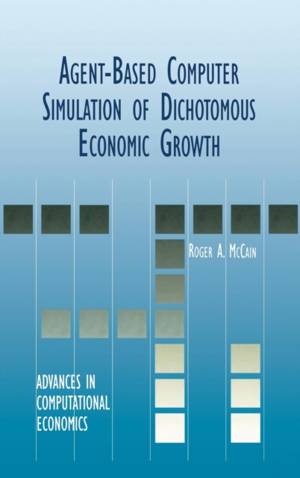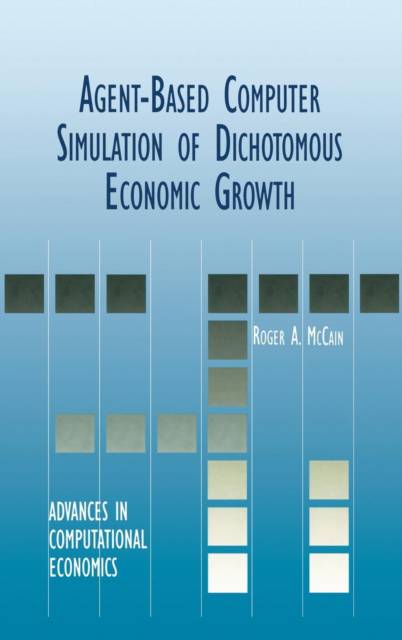
- Afhalen na 1 uur in een winkel met voorraad
- Gratis thuislevering in België vanaf € 30
- Ruim aanbod met 7 miljoen producten
- Afhalen na 1 uur in een winkel met voorraad
- Gratis thuislevering in België vanaf € 30
- Ruim aanbod met 7 miljoen producten
Zoeken
Agent-Based Computer Simulation of Dichotomous Economic Growth
Roger A McCain
€ 208,45
+ 416 punten
Uitvoering
Omschrijving
Agent-Based Computer Simulation of Dichotomous Economic Growth reports a project in agent-based computer stimulation of processes of economic growth in a population of boundedly rational learning agents.
The study is an exercise in comparative simulation. That is, the same family of growth models will be simulated under different assumptions about the nature of the learning process and details of the production and growth processes. The purpose of this procedure is to establish a relationship between the assumptions and the simulation results.
The study brings together a number of theoretical and technical developments, only some of which may be familiar to any particular reader. In this first chapter, some issues in economic growth are reviewed and the objectives of the study are outlined. In the second chapter, the simulation techniques are introduced and illustrated with baseline simulations of boundedly rational learning processes that do not involve the complications of dealing with long-run economic growth. The third chapter sketches the consensus modern theory of economic growth which is the starting point for further study. In the fourth chapter, a family of steady growth models are simulated, bringing the simulation, growth and learning aspects of the study together. In subsequent chapters, variants on the growth model are explored in a similar way. The ninth chapter introduces trade, with a spacial trading model that is combined with the growth model in the tenth chapter.
The book returns again and again to the key question: to what extent can the simulations `explain' the puzzles of economic growth, and particularly the key puzzle of dichotomization, by constructing growth and learning processes that produce the puzzling results? And just what assumptions of the simulations are most predictable associated with the puzzling results?
The study is an exercise in comparative simulation. That is, the same family of growth models will be simulated under different assumptions about the nature of the learning process and details of the production and growth processes. The purpose of this procedure is to establish a relationship between the assumptions and the simulation results.
The study brings together a number of theoretical and technical developments, only some of which may be familiar to any particular reader. In this first chapter, some issues in economic growth are reviewed and the objectives of the study are outlined. In the second chapter, the simulation techniques are introduced and illustrated with baseline simulations of boundedly rational learning processes that do not involve the complications of dealing with long-run economic growth. The third chapter sketches the consensus modern theory of economic growth which is the starting point for further study. In the fourth chapter, a family of steady growth models are simulated, bringing the simulation, growth and learning aspects of the study together. In subsequent chapters, variants on the growth model are explored in a similar way. The ninth chapter introduces trade, with a spacial trading model that is combined with the growth model in the tenth chapter.
The book returns again and again to the key question: to what extent can the simulations `explain' the puzzles of economic growth, and particularly the key puzzle of dichotomization, by constructing growth and learning processes that produce the puzzling results? And just what assumptions of the simulations are most predictable associated with the puzzling results?
Specificaties
Betrokkenen
- Auteur(s):
- Uitgeverij:
Inhoud
- Aantal bladzijden:
- 163
- Taal:
- Engels
- Reeks:
- Reeksnummer:
- nr. 13
Eigenschappen
- Productcode (EAN):
- 9780792386889
- Verschijningsdatum:
- 30/11/1999
- Uitvoering:
- Hardcover
- Formaat:
- Genaaid
- Afmetingen:
- 164 mm x 244 mm
- Gewicht:
- 426 g

Alleen bij Standaard Boekhandel
+ 416 punten op je klantenkaart van Standaard Boekhandel
Beoordelingen
We publiceren alleen reviews die voldoen aan de voorwaarden voor reviews. Bekijk onze voorwaarden voor reviews.











